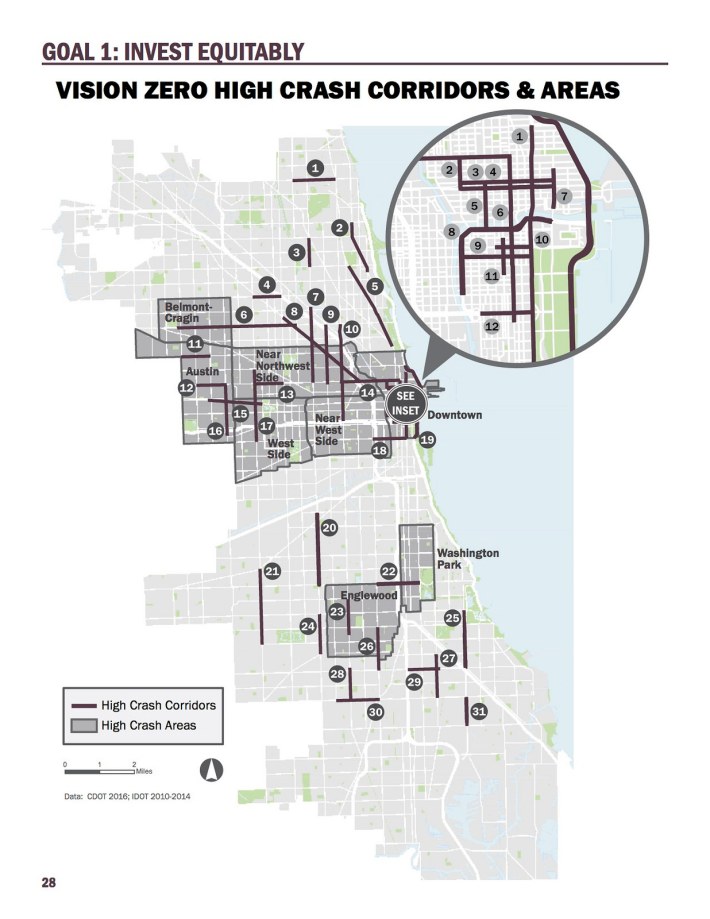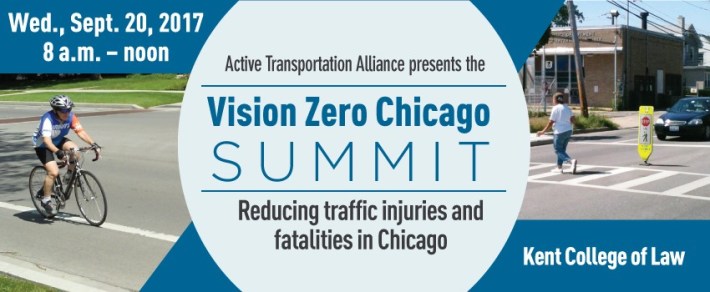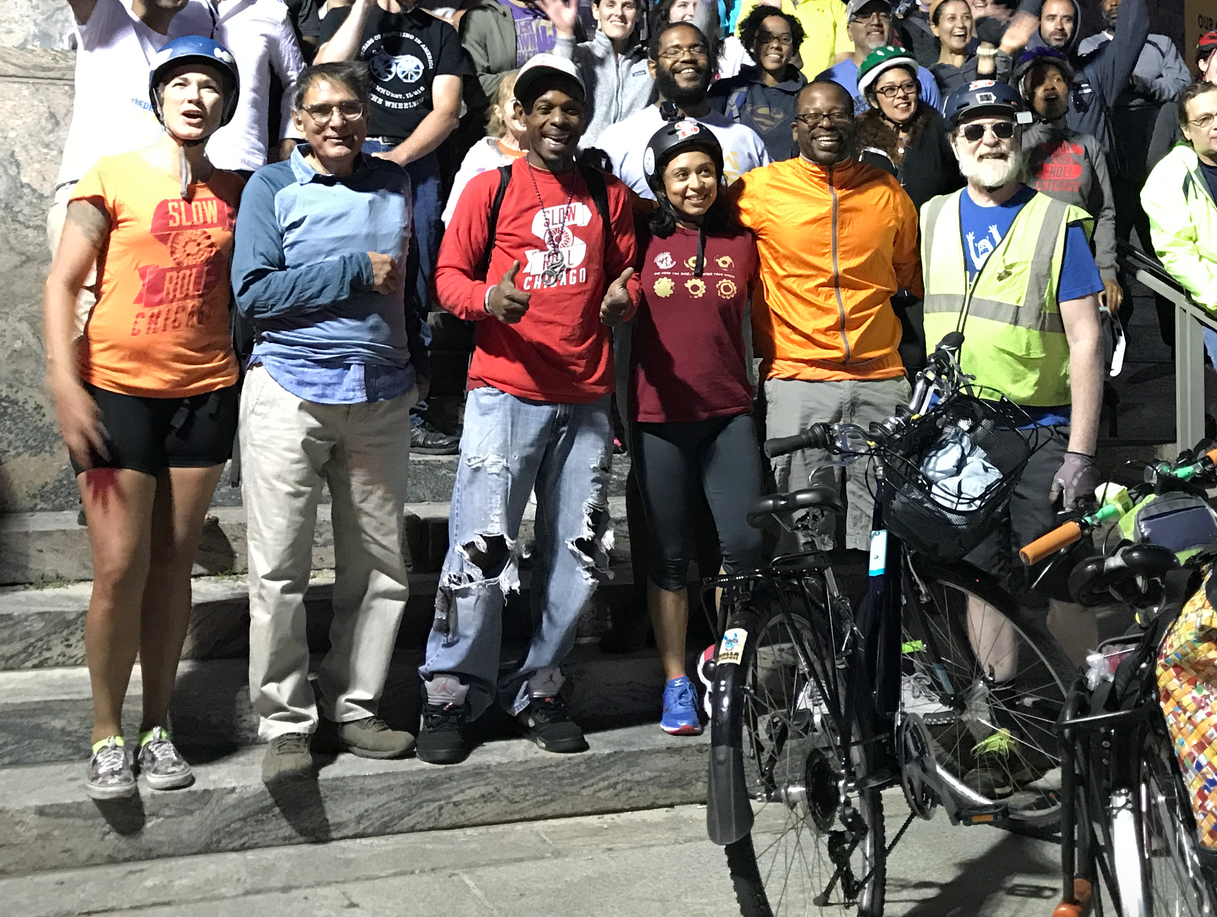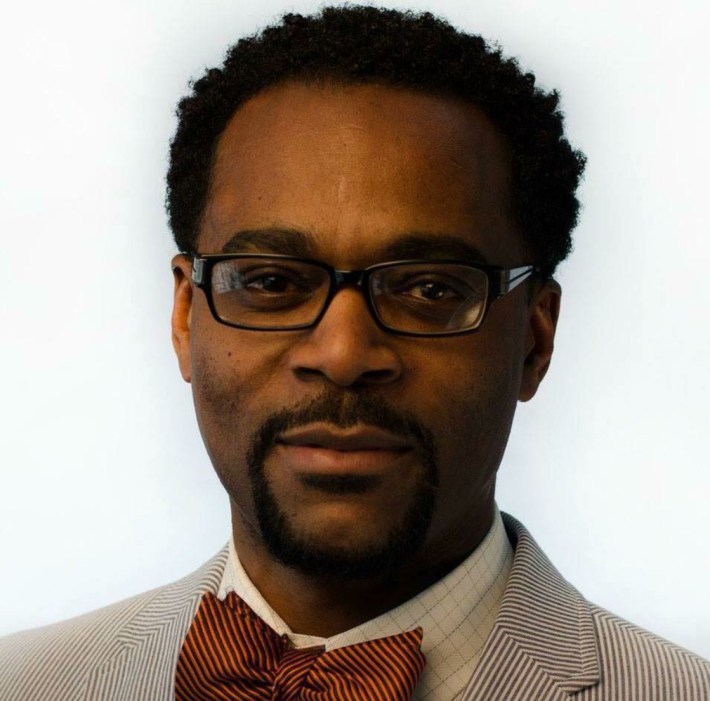Update Thursday, August 17, 3 PM:
On August 10, Streetsblog Chicago ran a post regarding Slow Roll Chicago cofounder Oboi Reed's concerns about the Active Transportation Alliance's planned Vision Zero Chicago summit. Read the original post below.
Yesterday Reed published a blog post about the issue with a detailed list of concerns about the summit, calling for the cancelation of the event. "For these reasons and more, I am calling for the Active Transportation Alliance to cancel their planned VZ summit and return to the drawing board to, from the beginning, engage [low-to-moderate-income / people of color] residents, community leaders and other stakeholder in the VZ targeted neighborhoods in a full partnership to develop and plan a VZ summit with the same high-level policymakers where our voices and concerns are respected, heard and responded to."
In response to Slow Roll's concerns and those of other community leaders, today Active Transportation Alliance director Ron Burke announced that the group will be postponing the summit. "We apologize for mistakes in how the event was rolled out," he wrote. "For these reasons, we have decided to postpone the summit and continue our work with community partners to build a stronger event."
Below is the August 10 Streetsblog post that first reported on Reed's criticisms of the summit plan.
Last Monday the Active Transportation Alliance announced that they’ll be presenting the Vision Zero Chicago Summit on Wednesday, September 20, from 8 a.m. to noon at Kent College of Law, 565 West Adams, to discuss the city’s effort to eliminate serious traffic injuries and fatalities by 2026. The keynote speaker is AAA state relations manager Richard Romer, and other scheduled presenters include Chicago Department of Transportation commissioner Rebekah Scheinfeld, transportation consultant Steve Schlickman (who formerly led UIC’s Urban Transportation Institute), and a representative from the National Safety Council. The announcement states that the event will include panel discussions on designing safer streets, fair and effective enforcement, and funding Vision Zero efforts. The registration fee is $50.
The city’s Vision Zero efforts are focusing on high crash areas and corridors, and most of the areas most heavily impacted by traffic violence are in lower-income communities of color on the South and West sides. These neighborhoods will be prioritized for safety outreach and education, beginning with a pilot program taking place this summer in Austin, North Lawndale, and Garfield Park, funded by a $185,000 grant from the National Safety Council.
On Monday evening at a ride hosted by Slow Roll Chicago, which promotes biking in low-to-moderate-income communities of color on the South and West Sides. During the event, SRC cofounder Oboi Reed told me he felt the roll-out and announced format of the upcoming Vision Zero summit, whether by design or an oversight, would have the effect of largely excluding residents of these three African-American neighborhoods from the conversation.

Reed noted that, nationally, there have been concerns that increased traffic enforcement as part of Vision Zero campaigns will result in more racial profiling and over-policing of communities of color. Therefore, he argued, it’s crucial that residents and community leaders from the pilot neighborhoods be involved in all discussions about what constitutes “fair and effective” policing, especially in light of the Chicago Police Department’s widely documented civil rights abuses. He said the summit's steep registration fee and downtown location would ensure that the attendees are mostly white-collar professionals who don’t live in the affected areas.
Reed added that while he had learned Active Trans is offering scholarships to the conference to those who can’t afford the fee, that information wasn’t initially included in Monday’s announcement. He argued that because influential decision makers like Scheinfeld and the National Safety Council rep will be at the summit, it would be especially problematic if few North Lawndale, Garfield Park, and Austin residents are there to make their voices heard.
I ran these concerns by Active Trans staff members. Director of government relations Kyle Whitehead responded that the summit is intended to be a Vision Zero policy discussion with city and state officials and outside experts, as well as community advocates. “We recognize the registration fee and timing of the event are barriers for many residents and non-professionals, which is why we are offering complimentary registrations for community leaders and partners, as we’ve done with similar events in the past,” Whitehead said. “Typically we’ve reached out to current partners with this information and encouraged them to spread the word to their peers in the community. We started this process immediately after announcing the event.”
Whitehead added that the $50 fee will help cover costs and support Active Trans’ Vision Zero advocacy. “Equity is a focus of the city’s plan and for the last few years we’ve pushed for more frequent and fair enforcement, highlighting potential negative impacts in communities of color,” he added. “The program and speakers are still being finalized, and we’ve asked community partners for input and recommendations. Equity will be central to every discussion, as it is in the plan, and we will include speakers from communities of color.”
Whitehead added that the event is not intended to take the place of the community planning processes and direct outreach to residents in the focus communities, which Active Trans intends to support and organize around moving forward. “For the Vision Zero plan to be successful, it needs to have robust community input,” he said. Some of the South and West Side community organizations which are on board with the group's Vision Zero efforts so far include Teamwork Englewood, the South Austin Neighborhood Association, and Connecting4Communities. Whitehead added that Active Trans has reached out to many other organizations and is looking for recommendations for other groups to partner with.

At the Mayor’s Pedestrian Advisory Council meeting on Wednesday, Active Trans director Ron Burke mentioned that one of the key purposes of the summit is to communicate to elected officials, such as aldermen, the importance of reducing traffic violence in their communities. In this way, the group hopes to get these leaders to commit to supporting additional city funding for safety outreach and infrastructure programs.
CDOT spokesman Mike Claffey did not have immediate information about when Scheinfeld will be appearing at events in the three Vision Zero focus communities. However, he noted that Slow Roll is leading A Bike Ride for Peace on Saturday, August 19 at 9 a.m. at the office of the community group BUILD Chicago, 5100 West Harrison, and the event will involve staff from the transportation department’s Vision Zero outreach team.
In response to Active Trans’ comments, Reed said he still feels that the development and planning of the Vision Zero summit was problematic. “It represents a consistent, harmful pattern of top-down policymaking in general here in Chicago, and this is also true nationally with regards to Vision Zero in many U.S. cities,” he said “There is a real potential for structural racism and implicit bias in [in the city government], especially within the Chicago Police Department, which could actually lead to Vision Zero's enforcement strategy doing more harm than good in communities of color.”
Reed added because of this potential for negative impacts, it’s critical for people who live in the focus communities to drive the planning and execution of Vision Zero policies in their neighborhoods. Because of this, he argued that Active Trans should cancel the planned summit and fundraiser and go back to the drawing board to create an event that would be more accessible to West Side residents in terms of cost, location, time, and marketing.
Reed suggested I also check in with Ronnie Matthew Harris, director of the South Side transportation advocacy Go Bronzeville. Harris echoed statements he made in a recent Streetsblog Chicago op-ed about the need for the livable streets movement to include more input from residents of color, and argued that Active Trans and the city need to take Reed’s concerns about the summit seriously and be responsive.
“Successful, sustainable, and measurable outcomes of Vision Zero will correspond with the extent to which we prioritize racial inclusion," he said. "If a community-based organizations like Slow Roll Chicago, whose primary mission is to advocate for racial equity on the behalf of low-to-moderate-income communities of color, feels excluded, it then becomes our duty to listen, hear, and act in response to their concerns.”
“As I've said before, transportation advocates and planners have a remarkable opportunity to right wrongs of the past,” Harris concluded. “But it'll only be realized through significant cultural shifts in the way we engage and include the most disenfranchised members of our community."





